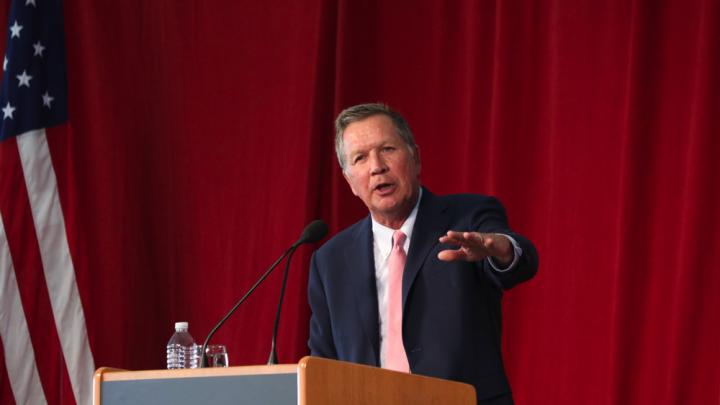After sharing some opening remarks with the Harvard Kennedy School’s class of 2018 and their guests, Dean Douglas Elmendorf set the stage for Ohio’s Republican governor John Kasich. “Not surprisingly, the positions that Governor Kasich has taken on various issues have won approval from some people in Ohio, and disagreement from others. The same is certainly true of those represented in this tent today. One of the important and wonderful principles of the Kennedy School is that this is a place where people stand for their views, and listen to others with different views with civility and respect.”
Those values of civility and respect were at the core of Kasich’s speech, which at different points sounded like a sermon, a call to action, and a lengthy retelling of the earliest stages of his own political career, which began with a meeting at the White House with then-president Richard Nixon while Kasich was a freshman at Ohio State University. “I didn’t really know what to expect when I came here today,” Kasich said, surveying the audience seated in John F. Kennedy Memorial Park. “I didn’t really know what to expect from this kind of a crowd. I kind of know what I want to say, but this is different from a public-policy speech.” He went on to talk about the nostalgia that comes with graduating from college, even though the average Kennedy School student enters somewhere between the ages of 27 and 39 and has already spent between three and 13 years in the workforce, according to admission statistics. “Over the past few days, you probably sat with some of your best friends and talked about your lives. You talk about, ‘What is the meaning of life?’ You go to a place like Harvard, which is the best of the best, and you talk about how you’re going to navigate the real world.”
After recounting and reflecting on the views of famous philosophers and theologians including Friedrich Nietzsche, John Locke, Albert Camus, Martin Luther, Saint Augustine, and Plato, Kasich asked the graduates to think critically about how they might build a better world. “The winds and change and fads and culture knock me off my bearings,” he said. “I need to have a compass.” That compass, he revealed, is faith. “Christians and Jews and Muslims all basically have the same view of human life. Human life is special. Human life is above all other life. The Creator created this human life above all else. It is our duty to reflect the character of our Creator and to recognize that every human being is made in the image of our Creator.”
After encouraging the imminent graduates to treat one another with respect, a value Kasich said has been missing from many facets of public life these days, he continued to describe how faith can play a critical role in finding life’s meaning. “I want to tell you what I think it means to put forth and try to adopt the character of our Creator,” he explained. “Whether it is Old or New Testament…if you search that book, you will find that it is all about love. It is about compassion. It is about humility. It is about forgiveness. It is about responsibility. It is about justice. It’s about personal responsibility. It is fundamentally about living life a little bigger than ourselves.
“I believe those virtues [respect, selflessness] are written on our hearts,” he elaborated, offering several examples, including the heroic efforts of those who threw their bodies in front of others during the October 2017 shooting at a country music concert in Las Vegas, the students from Parkland, Florida, who have been working to limit gun violence, and school teachers in his own state “who ran down the hallway to push the gunman out of the building.… I happen to believe when we recognize those virtues of love and compassion and humility, it can guide us to lead a simple life.”
But Kasich also acknowledged the costs of leading a selfless, virtuous, service-oriented life. “Are you willing to get out of your comfort zone?” he asked his audience. “There’s a guy in the Old Testament by the name of Daniel. They put him in the lion’s den. And guess what? We all enter the lion’s den. It’s just a matter of how we handle it when we’re there. There’s a price to pay for standing up, but when you do stand up, you go down in the minds of people around you as a hero, as an inspiration.”
The governor concluded his remarks by telling the degree candidates not to sit around and expect change to come from politicians and elected officials. “We tend to want to think about politicians, those bunch of bums. We spend time thinking about them because sometimes, we don’t want to think about what we’re doing, where we live, how we’re carrying out our lives.” Kasich suggested that those in positions of power in sports, media, Hollywood, and business are just as worthy of scrutiny as politicians when it comes to enacting change and carrying out virtous deeds. “Too many politicians put service to self above service to others,” he declared. “These mistakes demean us. But you know what? It’s not going to always be this way, and it’s not going to be this way if we slow our lives down and think about what real meaning is. When we think about humility and love and compassion, I know those virtues are written on our hearts. If we just slow down and reflect, we’ll get it right.”








